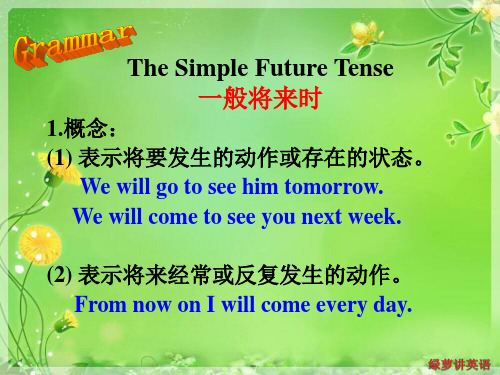一般将来时will的用法PPT课件
最新一般将来时课件will的用法课件ppt

Functional Practise:
1.Ihope that you__ a good time this evening. C
A.have B.are having C.will have D.has
jobs.
dull jobs.
Will he do dull Yes, he will.
jobs?
No ,he won`t.
There will be a There won`t be Will there be a Yes,there will. computer in it. a computer in it. compuer in it. No,there won`t.
一般将来时课件will的用法
我们除了用“be going to+动词原形” 可以表示一般将来时外, 我们还可以用“will+ 动词原形”来表示一般 将来时.
一般将来时的主要用法:
1、表示将来某一时刻的动作或状态: We will come to see you the day after tomorrow. There will be a wonderful show next week.
will句式总结:
肯定
否定
一般疑问 回答
I will have
I won`t have Will I have
Yes,I will.
many presents. many presents. many presents? No,I won`t.
He will do dull He won`t do
《Will一般将来时》课件

05
练习与巩固
选择题
总结词
考查知识点掌握程度
题目1
Will you _____ a movie tonight?
题目2
I _____ go to the park tomorrow.
填空题
总结词
01
检验语言运用能力
题目1
02
He _____ (not go) to the zoo next week.
例子
I think the stock market will rise next year.(我认为明年股市会上涨。)
表示意图
总结词
使用will表示个人的意图或意愿 ,通常与未来的行动相关。
详细描述
当想要表达个人的意图或计划在 未来做某事时,可以使用will的 一般将来时形式。例如,“I will
例句展示
通过多个例句展示了will在 各种情境下的用法。
练习与巩固
提供了针对will用法的练习 题,帮助学生巩固所学知 识。
学习心得分享
1 2
对will的理解加深
通过课件的学习,学生对will的用法有了更深入 的理解。
对英语时态的掌握
在学习will的同时,学生对英语时态有了更全面 的认识。
3
对英语学习的兴趣提升
will help you if you need it.”(如果你需要,我会帮助你。)
03
will一般将来时的用法详解
表示预测
总结词
使用will表示对未来的预测,通常基于当前的情况或事实。
详细描述
当想要表达对未来的预测或推测时,可以使用will的一般将来时形式。例如,“If it's sunny today, the weather forecast says it will be hot tomorrow.”(如果今天天气晴 朗,天气预报称明天会很热。)
一般将来时课件(PPT)

“be able to”表示将来有能力做某 事时,使用一般将来时形式,例如“I will be able to help you”。
情态动词如“can”、“may”、 “must”等,在一般将来时中通常直 接加动词原形,例如“I can swim”。
03
一般将来时在句子中的运用
陈述句中的使用
表示将要发生的动作或存在的状态
纠正方法
应使用正确的将来时形式,如 "He will go to the park tomorrow." 或 "He is going to the park tomorrow."
忽略动词变化规则
错误示例
They will play football in the future.(忽略了动词play在将来时中的变化)
纠正方法
在将来时中,应使用正确的助动词或情态动词形式,如 "I will be able to help you with your homework." 或 "I can help you with your homework."
错误示例
He will must finish his work before leaving.(错误地使 用了情态动词must)
作用
用于表示未来的计划、打算、预测、 假设等。
常见表达形式
will + 动词原形
表示将来的动作或状态,如“I will go to the park tomorrow.”(我明天将去公园。)
be going to + 动词原形
表示计划、打算或即将发生的动作,如“I am going to study hard this semester.”(我这 学期打算努力学习。)
一般将来时PPT课件

•一般将来时基本概念•一般将来时结构与用法•一般将来时时间状语及标志词•一般将来时与其他时态对比•一般将来时在各类从句中运用•一般将来时误区及注意事项•总结回顾与拓展延伸目录01一般将来时基本概念定义与特点定义特点表现形式will + 动词原形be going to + 动词原形现在进行时表示将来预测未来计划与安排条件与假设030201使用场景02一般将来时结构与用法主语+ be not going to + 动词原形+ 其他成分主语+ be to not (非标准用法,尽量避免使用) + 动词原形+ 其他成分主语+ will not (won't) + 动词原形+ 其他成分Will + 主语+ 动词原形+ 其他成分?Be + 主语+ going to + 动词原形+ 其他成分?Be + 主语+ to + 动词原形+其他成分?(较少使用,多用于书面语)特殊疑问词动词原形特殊疑问词going to +成分?特殊疑问词to +(较少使用,多用于书面语)注意:在一般将来时的使用中,要注意区分不同语境和表达方式的细微差别,选择合适的结构进行表达。
同时,也要注意与其他时态的区分和联系,避免混淆使用。
特殊疑问句结构03一般将来时时间状语及标志词常见时间状语表示将来的时间状语表示计划或安排的时间状语标志词识别与运用04一般将来时与其他时态对比与现在进行时对比时间指向不同01动词形式差异02使用情境不同03时间基准差异动词形式变化使用情境区别时间范围不同动词形式区别使用情境差异05一般将来时在各类从句中运用在宾语从句中运用01 02定语从句的时态取决于它所修饰的先行词,如果先行词是将来时态,定语从句也使用将来时态。
如果先行词是过去将来时,定语从句则使用过去将来时。
定语从句中表示将来的时间状语有:tomorrow, next year, in the future 等。
06一般将来时误区及注意事项误区二过度使用“will”和“going to”。
初中英语一般将来时will和be going to讲解课件

going to, 而多用will。 如:
If any beasts comes at you, I'll stay with you and help you.
1.Bob and I _w__il_l_m__a_tc_h__(watch) an action movie tomorrow.
2.We __w__il_l _b_e____(be) able to go to space in the future.
时间状语:
tomorrow 明天
next week 下周
next month 下个月 next year 明天
before不久
soon 不久
the day after tomorrow 后天
the year after next 后年
the week after next 下下周
基本句型: 肯定句: 主语 + will +v. 原形 否定句: 主语 + will +not + v.原形 一般疑问句: will +主语 + v.原形
3.The childrenw_i_ll_d_i_s_cu__ss__(discuss) the plan after school.
He is seriously ill. He is going to die. He will be twenty years old.
一般将来时PPT课件

05
解析
含有will的句子改为否定句时 ,在will后加not,缩写为 won't。
06
THANKS
感谢观看
06
一般将来时练习题精选与解析
选择题精选与解析
01
题目:I _______ to the cinema. Will you go with me?
02
A. go B. am going C. have gone D. went
选择题精选与解析
答案:B
解析:由后一句“Will you go with me?”可知是打算去做某事,是一般将来时,所以用现 在进行时表将来,选B。
题目:— What _______ you _______ to do tomorrow?
选择题精选与解析
— I _______ visit my uncle. A. are; going; am going B. are; going; am going to
C. are; going to; am going D. are; going to; am going to
区别
现在进行时强调当前正在进行的动作 或状态,而一般将来时则强调未来将 要发生的动作或状态。
联系
两者都可用于表示将来的情况,但侧 重点不同。现在进行时通过现在正在 进行的动作暗示将来,而一般将来时 则直接表达将来的动作或状态。
与过去将来时的区别与联系
区别
过去将来时表示从过去某一时间 看将要发生的动作或状态,而一 般将来时则是从现在看将来要发 生的动作或状态。
表示将来经常发生的动作或习惯
常用的时间状语
always, often, usually等 。
句子结构
一般将来时willppt课件

特殊疑问句:特殊疑问词+will+主语+V.原形+其他 What will your dream school have?
一般将来时will
2. There be句型的一般将来时 肯定句: There will be +名词+其他成份 无论后面加单数名词或复数形式,be必须用原形。
There will be only one country. There will be many workers in this city.
1. 结构
一般将来时will
肯定句:主语+ will +动词原形e will go to the moon.
否定句:在will后面加not(will not可缩写为 won’t) They will not (won’t) use books.
一般疑问句:will提到句子主语前,结尾变问号 Will students go to school in the future?
(2)表示将来某一段时间内经常的动作或状态: The students will come and work in the lab once a week. We will come and work in this factory every year.
否定句:在will后面加not There won’t be only one country.
一般疑问句:把will提到there之前 Will there be only one country? Yes, there will. / No, there won’t.
一般将来时will
3. 用法 (1)表示将来某一时刻的动作或状态: We will come to see you the day after tomorrow. There will be a wonderful show next week.
一般将来时(8张PPT)初中英语专项复习课件

肯定句:主语+ will +do+其他 People will have robots in their homes. 否定句:主语+ will not /won't+do+其他 People will not/won’t have robots in their 一般疑问句:Will+主语+do+其他? 肯定回答:Yes, they will. 否定回答:No, they won’t. Will people have robots in their homes?
homes.
2.而be going to +do通常用来谈论在一个较近的未来将要发生的计 划中的或是有可能发生的事。如:
I am going to visit us next month.(在一个较近的未来将要发生 的计划中的事)
It is so cloudy. I think it’s going to rain. (有可能发生的事)
一般将来时
初中英语专项复习
一、一般将来时的意义: 用来描述一个即将要发生的动作;谈论未来的计划和打算。
二、一般将来时的基本结构: will/shall+动词原形
be going to+动词原形
常见时间状语:
next Tuesday next week the coming Sunday next year this afternoon
tomorrow tonight in a few minutes in the future in five years
三、一般将来时
1.will 用于一切人称,shall只用于第一人称(I/we)。但现代英语倾向 于所有人称都使用will而不用shall。will/shall + do通常用来谈论未 来会发生的事或是正在制定的计划。 It will rain this afternoon.(未来发生) I will take an umbrella with me.(计划)
《Will一般将来时》课件

1 Positive
主语 + will + 动词
2 N eg ative
主语 + will not + 动词
3 Question
Will + 主语 + 动词
一般将来时的用法
表达意愿
我将会去参加明天的会 议。
预测未来
明天会下雨。
提出建议
你应该明天早点休息。
例句和练习
1
例句
明天我将和朋友去看电影。
例句
意愿、预测、建议等
技巧
表达自信、使用时间表达、 多练习
使用一般将来时的技巧
Be confident
积极表达信心和决心。
Use tim e ex p res s io n s
明天、将来、下个星期 等词汇可以增强时态的 表达。
Practice with exercises
多做一些练习可以更好 地掌握一般将来时的用 法。
总结和要点
构成
will + 动词
用法
2
他明天不会来上班。
3
练习
请用一般将来时造句:
明天我们将去旅行。
注意事项和常见错误
1 D on't forg et
the subject
错误:Will go to the party.
正确:I will go to the party.
2 D on't use
c o n trac tio n s in form al writing
错误:I'll finish it tomorrow.
正确:I will finish it tomorrow.
《一般将来时》课件

be going to+动词原形
结构
主语+be going to+动词原形+其他 成分
例子
We are going to meet at the train station at 5:00.(我们计划在5点钟 在火车站见面。)
含义
表示计划或安排将来要发生的动作或 状态
用现在进行时表示
结构
主语+be+动词现在分词+ 其他成分
一般将来时可以用来表示对未来事件的预见或推测,通常与时间状语连用,如“in the future”、 “next year”等。例如,“It will rain tomorrow.”(明天会下雨。)
表示意图、打算或希望
总结词
表示个人的意图、打算或意图、打算或希望,通常与 表示意图的动词连用,如“plan”、“intend”、“hope” 等。例如,“I will visit my grandparents next week.”( 我打算下周去看望我的祖父母。)
含义
表示将来某个时间正在进 行的动作或状态
例子
He is coming here next week.(他下周将会来这 里。)
用一般现在时表示
结构
主语+动词原形+其他成分
含义
表示将来某个时间经常发生的动作或状态
例子
I do my homework every day.(我每天都会做作业。)
03
一般将来时的肯定句、否定句和 疑问句
感谢观看
基本构成
will + 动词原形
疑问句形式
Will + 主语 + 动词原形
否定句形式
一般将来时课件PPT.上课用

与“be going to + 动词原形”和“will + 动词原形”相比,“be about to + 动词原形”更强调即将发生的紧迫性。
04
一般将来时的否定形式
will not = won’t
01
"will not" 是 "will" 的否定形式 ,表示将来某个时间不会发生某 件事情。
明年这个时候我们将在巴黎度假。
表示未来的时间状语从句的连用
一旦你完成这个项目, 你就可以休息了。
即使明天下雨,我们 也会按时举行运动会。
只要他一回来,我们 就出发。
表示未来的时间状语从句的省略
明天见。 下周再见。
明天这个时候我们会在飞机上。
THANKS
主语 + will not + 动词原形 + 其他成分,例如:He will not come back until next month.(他下个月之前不会回来。)
Will + 主语 + 动词原形 + 其他成分,例如:Will you be available this afternoon?(你今天下午有空吗?)
表示预测和推测
总结词
一般将来时也可以用来表示对未来的预测和推测,通常基于 某种事实或证据。
详细描述
当我们根据已知事实或证据推断某件事情将在未来发生时, 可以使用一般将来时。例如,“根据天气预报,明天会下雨 ”表示对天气的预测,“根据市场趋势,明年房价可能会上 涨”表示对未来的推测。
表示意愿和打算
05
一般将来时的疑问形式
will + 主语 + 动词原形?
总结词
一般将来时课件(PPT)

现在进行时表示
总结词
表示现在正在进行的动作,暗示将来还会继 续
详细描述
现在进行时可以用来表示现在正在进行的动 作,并暗示将来还会继续。例如,“I am studying for the exam next week.”(我 正在为下周的考试学习。)
一般现在时表示
总结词
表示现在经常发生的动作或存在的状态,暗 示将来也会如此
详细描述
使用"will+动词原形"的结构来表示将来 某个时间点将要发生的动作或状态,例 如"I will go to the park tomorrow." (明天我将去公园)。
be going to+动词原形
总结词
表示计划或安排将来要发生的动作或状态。
详细描述
使用"be going to+动词原形"的结构来表示计划或安排将来要发生的动作或状 态,例如"I am going to have a party next weekend."(下周末我将举办一个 聚会)。
详细描述
使用“be going to+动词原形”的结构来表示计划或安排将来发生的动作,例如“We are going to have a par来某个时间正在进行的动作。
详细描述
使用现在进行时来表达将来某个时间正在进行的动作,例如“I am meeting my friend tomorrow” 。
一般将来时课件
目录
• 一般将来时的定义 • 一般将来时的句型结构 • 一般将来时的肯定句 • 一般将来时的否定句 • 一般将来时的疑问句
01
一般将来时的定义
什么是将来时态
01
Will一般将来时ppt课件

一般将来时表示将来发生的动作或存在的状态 助动词shall/will + 动词原形(当主语第一人称时, 一般用shall,shall用于第一人称,常被will 所代 替。)
肯定式: 主语+shall/will+动词原形+其他 否定式: 主语+shall/will+not+动词原形+其他. 疑问式: Shall/Will+主语+动词原形+其他 简略回答: (肯) Yes,主语+shall/will .
I feel ill now, and I'll go to see the doctor. I'm going to see the doctor this evening.
He is studying hard and is going to try for the exams. 他 正努力学习,准备参加考试。(不能用will替换)
----What are you going to do this evening? ----I’m going to see a film.
You will be forty years old next year. Tomorrow will be Sunday again.
2. be going to+动词原形可表示事先计划的意图,而 will 则表示说话人当时决定的意图; We're going to drive you home after the meeting. Don't call a taxi. We'll drive you home.
(三)、现在进行时
表示位置转移的动词常与现在进行时和表示将来的 时间状语连用,表示在最近将要发生某事。这些事是 事先安排好的。例如:
一般将来时课件will的用法

表示习惯或规律
总结词
表示一种习惯或规律性的行为。
详细描述
在一般将来时中,will可以用来表示一种习惯或规律性的行为,通常与表示频率的副词连用,如"He will go to the gym every week."表示他每周都会去健身房锻炼。
03
will 在不同语境中的用法
在疑问句中的用法
总结词
与 shall 的对比
Will
表示将来某个时刻一定会发生的动作或状态。
Shall
主要用于法律、合同等正式文体中,表示义务或规定。
与 be going to 的对比
Will
强调意愿和计划,表示未来的打算或预 测。
VS
Be going to
表示即将发的动作或状态,强调当前的 情况和趋势。
与 must 的对比
Will
表示未来的可能性或必然性,不强调强制性 。
Must
表示必须或义务,强调强制性和必要性。
05
will 的常见错误和注意事项
常见错误
遗漏助动词will
在构成一般将来时态时,常常会忘记 使用助动词will。
时态混淆
将一般将来时与现在进行时混淆,例 如使用“I am going to”代替“I will”。
在强调句中的用法
总结词
强调未来事件或动作的可能性或意愿
详细描述
在强调句中,“will”可以用于强调 未来事件或动作的可能性或意愿。例 如,“I will definitely finish this project on time!”(我一定会按时 完成这个项目!)
04
will 与其他情态动词的对比
THANK YOU
2024版高中一般将来时PPT课件图文

表示客观必然性
有些情况下,一般将来时 可以表示客观必然性,如 The sun will rise tomorrow.
05 练习题及答案解 析
填空题专项训练
根据句意和所给汉语 提示,填写正确的动 词形式。
根据语境和时态提示, 填入正确的动词形式, 完成句子。
用所给动词的适当形 式填空,使句子意思 完整、通顺。
计划和打算
一般将来时也可以用于表达个人的计划、打算或安排,例如:They will arrive at the airport at 9:00.(他们将于9点到达机场。)
条件和可能性表达
条件状语从句
在if或unless等引导的条件状语从句中,主句用一般将来时,从 句用一般现在时表示将来,例如:If it doesn't rain tomorrow, we will go for a picnic.(如果明天不下雨,我们就去野餐。)
礼貌原则在跨文化交际中应用
尊重对方文化
01
在跨文化交际中,应尊重对方的文化背景和习惯,避免使用可
能引起误解或冲突的未来表达方式。
谨慎承诺
02
在不确定能否履行承诺的情况下,应谨慎使用过于确定的未来
表达方式,以免造成不必要的误解或压力。
适时调整
03
根据交际的进展和对方的反馈,适时调整自己的未来表达方式,
或存在的状态。
否定句
主语 + will/shall + not + 动词原 形,表示将来某个时间不会发生的 动作或不存在的状态。
疑问句
Will/Shall + 主语 + 动词原形,用 于询问将来某个时间是否要发生某 个动作或存在某个状态。
一般将来时课件PPT

情态动词练习
总结词
理解情态动词在否定句中的作用
详细描述
解释情态动词如"can't", "won't", "shouldn't"等在否定句中的用法,并 通过例句和练习加深学生对情态动词 的理解。
助动词will练习
总结词
熟悉助动词"will"的否定形式
详细描述
介绍助动词"will"的否定形式"won't", 并通过例句和练习让学生熟练掌握其 用法,如"He won't come tomorrow."等。
助动词will练习
总结词
掌握助动词的用法
详细描述
通过助动词"will"的练习,学生可以进一步了解助动词在一般 将来时中的用法。学生将学习如何正确使用助动词与其他时 态连用,如过去将来时和将来完成时。
05
一般将来时的否定句练习
简单句练习
总结词
掌握简单句的否定形式
详细描述
通过例句和练习,让学生掌握一 般将来时的简单句否定形式,如 "I will not go to the party."和 "She will not buy that car."等。
结构
一般将来时的基本结构是“主语+will+动词原形”,有时也可以用“be going to+动词原形”来表示。
特点
预测性
不确定性
一般将来时主要用来表示对未来的预 测,包括个人的预测、科学的预测和 基于事实的预测。
一般将来时也可以表示对未来事件的 不确定性,例如“I will see you later, but I'm not sure when.”。
一般将来时--will-的用法ppt课件

have a lot of homework 整理版课件 There is a school.7
1).Teacher won’t use chalk on the blackboard in the future.
2). Students won’t use pen and paper in the future .
have a picnic
stay in bed
On Sunday…
buy some clothes
整理版课件
15
play the piano
Exercises
请根据句意选择正确的选项填空。 1. We’ll _C__ at the school gate.
A. meets B. meeting C. meet 2. Each of the students will _A__ a
Look at the pictures and make sentence using be going to…
—I/She/He/They am/is/are going to…
swim
play table tennis
cook
play basketball wa整t理c版h课件TV go over lesso1ns
1).Will he go over lessons at the weekend?
Yes, he will./ No, he won’t.
2).Will she help with the housework at the weekend?
Yes, she will./ No, she wont.
—Yes, there will./ No, there won’t. ——Will they send their homework to
- 1、下载文档前请自行甄别文档内容的完整性,平台不提供额外的编辑、内容补充、找答案等附加服务。
- 2、"仅部分预览"的文档,不可在线预览部分如存在完整性等问题,可反馈申请退款(可完整预览的文档不适用该条件!)。
- 3、如文档侵犯您的权益,请联系客服反馈,我们会尽快为您处理(人工客服工作时间:9:00-18:30)。
Look at the pictures and make sentence using will…(at the weekend)
I,/ He,/ She, /We, /They will ….
do her homework
Damming
stay in bed have a picnic have a party
11
“will”的否定句: They won’t use books. The teachers won’t write on the blackboard
否定句:主语+will not (won't)
+动词原形
.
12
“will”的一般疑问句:
——Will there be schools in the future? ——No, there won’t. 一般疑问句:—Will+there+be+……?
Step 4 Summary
“will”的肯定句:
Everyone will study at home. Everyone will have a computer on their desk.
“will”引导的“一般将来时”表示未来的
事实或对未来的预测等。
肯定句:主语+ will+ 动词原形
.
have a party
stay in bed
. have a picnic(野餐)5
1).I will check my email at the weekends.
2).They will have a party at the weekend.
3).He will stay in bed at the weekend.
—Yes, there will./ No, there won’t. ——Will they send their homework to
the teachers by email? ——Yes, they will. / No , there won’t. 一般疑问句:—Will+主语+动词原形?
have a picnic
stay in bed
On Sunday…
buy some clothes
.
15
play the piano
Exercises
请根据句意选择正确的选项填空。 1. We’ll _C__ at the school gate.
A. meets B. meeting C. meet 2. Each of the students will _A__ a
4).Jim and Lilli will have a picnic at
the week end. .
6
Please make sentence using won’t in the future
teacher use chalk on the blackboard
students use pen and paper
.
2
The Simple Future Tense
一般将来时
will 的基本用法
.
3
Teaching aims:
学会一般将来时will 的陈述 句, 否定ຫໍສະໝຸດ , 一般疑问句及 回答。.
4
Please make sentence using will at the weekend
check my email
—Yes,主语. +will./No,主语+won’1t3 .
Talk about your plans at the weekend using will
have a piano lesson
check my email
On Saturday…
do my homework
.
14
go over the lessons
have a lot of homework .
There is a school.7
1).Teacher won’t use chalk on the blackboard in the future.
2). Students won’t use pen and paper in the future .
Look at the pictures and make sentence using be going to…
—I/She/He/They am/is/are going to…
swim
play table tennis
cook
play basketball watch. TV go over lesso1ns
1).Will he go over lessons at the weekend? Yes, he will./ No, he won’t. 2).Will she help with the housework at the weekend? Yes, she will./ No, she wont. 3)Will they see a movie at the weekend? 4).Will she check her email at the weekend? 5).Will Jim have a piano lesson at the weekend? 6). Will they have a picn. ic at the weekend? 10
Yes①,he/she /they…②will. No, he/she③/they… won’t
_go__ov_e_r_le_s_so_n_s h_e_lp__w_it_h_th_e_h_o_u_se_w_o_r_k __se_e_a_m__ov_i_e
④
⑤
⑥
_ch_e_ck__h_er_e_m_a_il h_a_v_e_a_p._ia_n_o_l_es_so_n_ _ha_v_e_a_p_i_c9n_ic
3).Students won’t have a lot of homework in the future .
4).There won’t be school in the future.
.
8
Talk their plans at the weekend using Will he/ she/ they/ Lilli/ Jim/ you …?
